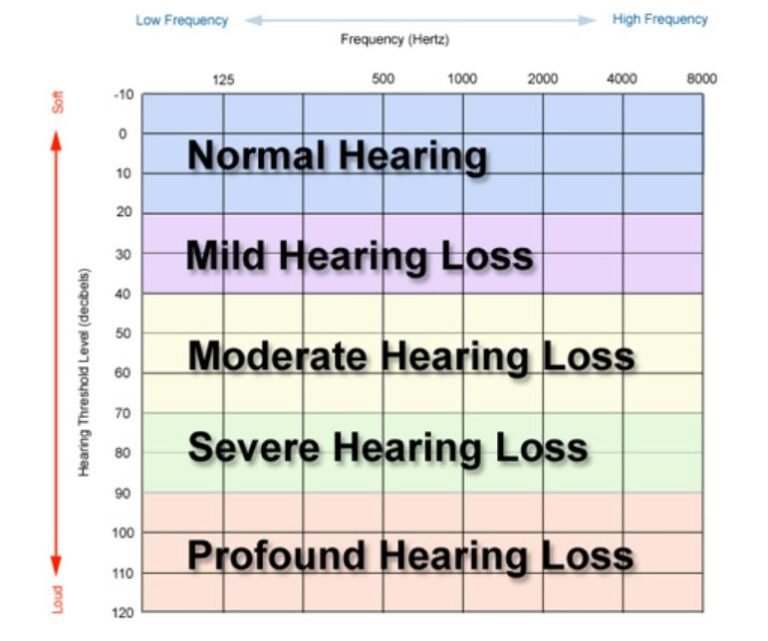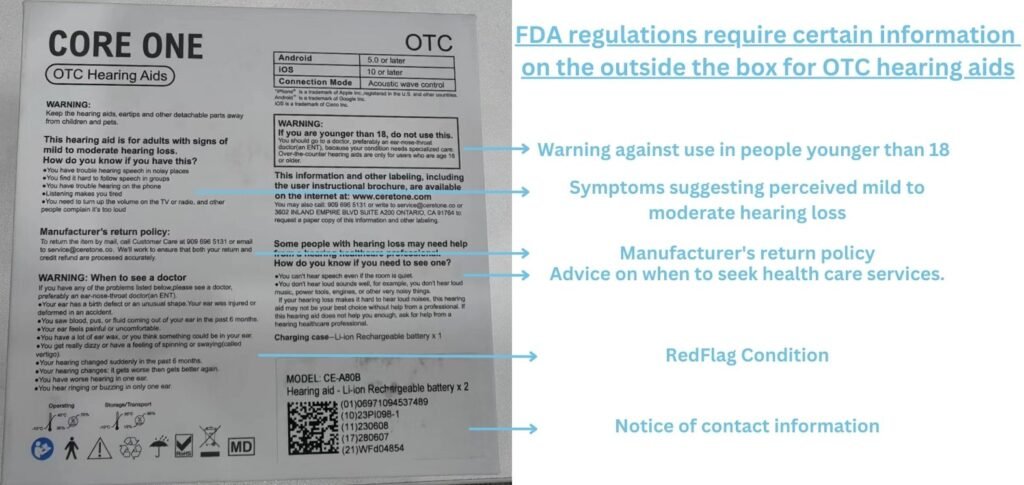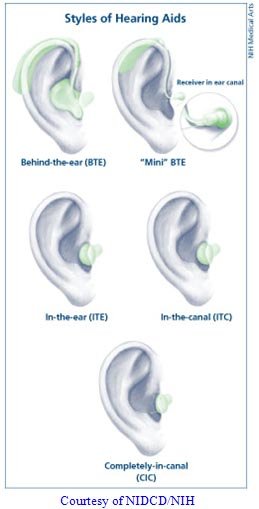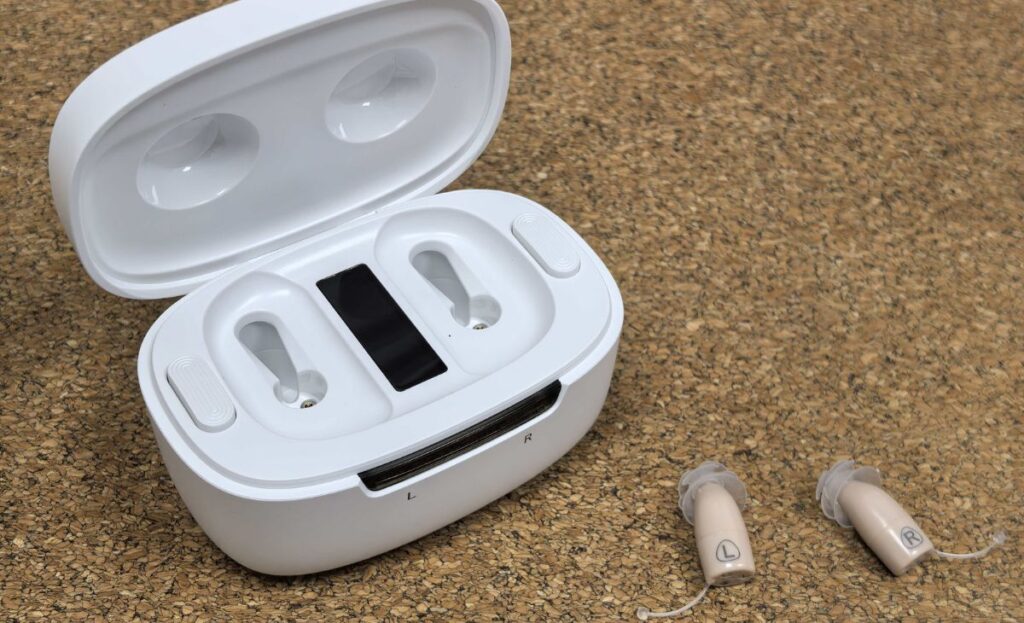
OTC Hearing Aids Buyers Guide: Everything You Need to Know Before Making a Purchase
Having personally encountered the challenges of mild hearing loss resulting from multiple surgeries for otitis media, I developed a keen interest in the world of OTC hearing aids. My own experience led me to review two popular OTC hearing aid options, one from Ceretone and another from Jinghao, which further fueled my curiosity and dedication to research. As a result, I have compiled this comprehensive OTC Hearing Aids Buyers Guide, drawing from my personal encounters and thorough investigations.
Ceretone Core One Hearing Aids Review
Jinghao Aid One Hearing Aids Review
In this guide, I will share insights and knowledge to help individuals navigate the process of purchasing OTC hearing aids with confidence. I will explore crucial topics such as understanding the concept of OTC hearing aids, examining FDA regulations, evaluating individual hearing needs, considering key factors, conducting thorough brand and model research, managing budget constraints, seeking professional advice, and providing practical tips for trying and evaluating OTC hearing aids.

Table of Contents
OTC Hearing Aids Introduction
Definition and Benefits of OTC Hearing Aids
OTC Hearing Aids are air-conduction hearing aids that do not require implantation or other surgical intervention. They bring amplified sound into the ear canal. Sound then moves through the eardrum and three tiny bones in the middle ear to reach the inner ear, where it’s processed and sent to the brain.
FDA

Firstly, OTC hearing aids are typically more affordable than their prescription counterparts, making them a cost-effective solution for individuals seeking hearing assistance.
Secondly, they provide convenience and autonomy, allowing users to manage their own hearing needs without the need for multiple visits to healthcare professionals.
Additionally, OTC hearing aids can help individuals regain clarity in conversations, enhance their ability to engage in social activities, and improve their overall quality of life. With their ease of access and potential to address mild to moderate hearing loss, OTC hearing aids have the potential to make a positive impact on the lives of many individuals seeking hearing assistance.
Comparison to Prescription Hearing Aids
When considering hearing aids, it’s important to understand the distinction between OTC hearing aids and prescription hearing aids. OTC hearing aids are available for purchase directly by consumers without the need for a prescription or professional fitting, while prescription hearing aids require a prescription from a licensed hearing healthcare professional.
One key difference between the two is the level of customization and personalization. Prescription hearing aids are individually programmed and tailored to the specific hearing needs of the user through comprehensive assessments and fitting by a professional. This ensures a precise fit and optimal performance based on the individual’s unique hearing profile. On the other hand, OTC hearing aids offer a more generalized approach, typically with preset settings that may not be as finely tuned to individual hearing requirements.
Another difference lies in the level of hearing loss they address. Prescription hearing aids are designed to accommodate a wider range of hearing loss, from mild to severe, and may include advanced features and technologies to address specific needs. OTC hearing aids, on the other hand, are typically suitable for individuals with mild to moderate hearing loss.
Cost is also a significant factor. OTC hearing aids generally have a lower price point compared to prescription hearing aids, which can be more expensive due to professional fitting, customization, and ongoing support provided by hearing healthcare professionals.
Ultimately, the choice between OTC hearing aids and prescription hearing aids depends on the individual’s hearing needs, preferences, and budget. While OTC hearing aids offer accessibility and affordability, prescription hearing aids provide a higher level of customization and expert guidance. Consulting with a hearing healthcare professional can help individuals make an informed decision based on their specific circumstances.
Target Users and Hearing Loss Levels

OTC hearing aids are primarily intended for individuals with mild to moderate hearing loss. Mild hearing loss refers to a difficulty in hearing softer sounds, while moderate hearing loss involves difficulty in hearing both soft and moderately loud sounds. OTC hearing aids offer a convenient and accessible solution for these individuals who may experience challenges in various listening situations, such as conversations in noisy environments or understanding speech on the telephone.
These hearing aids are designed to address the needs of individuals who may not have severe hearing loss but still require assistance in amplifying sounds to improve their overall hearing ability. OTC hearing aids offer a range of amplification settings and features that can be beneficial for individuals with mild to moderate hearing loss, helping to enhance speech clarity and improve communication in various daily situations.
However, it is important to note that individuals with more severe or profound hearing loss may require the specialized services and features provided by prescription hearing aids. In such cases, it is recommended to consult with a licensed hearing healthcare professional to assess the specific needs and determine the most appropriate solution.
Overall, OTC hearing aids target individuals with mild to moderate hearing loss, offering an accessible and cost-effective option to improve their hearing capabilities and enhance their quality of life.
Regulations and FDA Guidelines
Overview of FDA Regulations for OTC Hearing Aids
The FDA (U.S. Food and Drug Administration) plays a crucial role in regulating OTC hearing aids to ensure consumer safety and efficacy. In recent years, the FDA has implemented regulations specific to OTC hearing aids to provide clearer guidelines for manufacturers and consumers alike. These regulations require OTC hearing aids to meet certain standards in terms of safety, labeling, and performance.
Under the FDA regulations, OTC hearing aids are classified as Class I or Class II medical devices, which means they pose minimal to moderate risk to the user. Manufacturers are required to comply with labeling requirements that provide essential information to consumers, including details about product specifications, limitations, and proper usage. The labeling must also include a prominent statement notifying consumers to consult a healthcare professional for the evaluation of their hearing loss before purchasing the device.
Additionally, the FDA regulations specify that OTC hearing aids should be designed to amplify sound for individuals with mild to moderate hearing loss. They should not be marketed for individuals with severe or profound hearing loss, as these cases generally require more specialized and personalized interventions.
By implementing these regulations, the FDA aims to strike a balance between accessibility and safety, ensuring that OTC hearing aids meet certain standards while empowering individuals to make informed decisions about their hearing health. It is important for consumers to be aware of these regulations and look for FDA-compliant OTC hearing aids when considering their options.

Understanding the Requirements and Safety Standards
The FDA has established specific regulations for OTC hearing aids to ensure consumer safety and maintain certain quality standards. The key requirements and safety standards set by the FDA for OTC hearing aids include:
Class I or Class II Classification: OTC hearing aids are classified as Class I or Class II medical devices, indicating minimal to moderate risk to the user.
Labeling Requirements: Manufacturers must comply with labeling guidelines, which include providing essential information to consumers about product specifications, limitations, and proper usage. The labeling should prominently state that individuals should consult a healthcare professional for the evaluation of their hearing loss before purchasing the device.
Amplification for Mild to Moderate Hearing Loss: OTC hearing aids are designed to amplify sound for individuals with mild to moderate hearing loss. They should not be marketed for individuals with severe or profound hearing loss, as these cases generally require more specialized interventions.
Safety and Efficacy: OTC hearing aids must meet certain safety and efficacy standards to ensure they are suitable for consumer use. The FDA regulations aim to ensure that OTC hearing aids are safe and provide adequate benefit to individuals with mild to moderate hearing loss.
These regulations help maintain consumer safety, provide transparency in labeling, and ensure that OTC hearing aids are appropriate for the intended user population. It is essential for manufacturers and consumers to adhere to these requirements and standards set by the FDA when manufacturing, marketing, and purchasing OTC hearing aids.
Assessing Your Hearing Needs
Identifying Your Type and Level of Hearing Loss


To identify your type and level of hearing loss, you have a few options. Consulting with a licensed hearing healthcare professional is always recommended as they can provide a comprehensive evaluation. However, nowadays, there are online hearing tests available from many OTC hearing aid brands. These tests can help determine your hearing loss level and guide you in selecting the appropriate OTC hearing aids. Some OTC hearing aids even offer self-fitting or remote fitting options, where the devices can adjust automatically based on your hearing needs. With advancements in technology, you don’t need to worry about the complexity of identifying your hearing loss level, as OTC hearing aids can adapt to your specific requirements.
Consulting with an Audiologist if Necessary
Consulting with an audiologist is highly recommended if you require a comprehensive assessment of your hearing needs. An audiologist is a licensed hearing healthcare professional who specializes in evaluating and managing hearing-related issues. They have the expertise and tools necessary to conduct thorough hearing evaluations and provide valuable insights into your specific hearing requirements.
During a consultation with an audiologist, they will conduct various tests to assess your hearing abilities, determine the type and degree of your hearing loss, and identify any underlying conditions that may be affecting your hearing. This comprehensive evaluation helps to accurately assess your hearing needs and provides a solid foundation for finding the most appropriate solutions.
Working with an audiologist ensures that your hearing needs are properly diagnosed and that you receive personalized recommendations tailored to your unique circumstances. They will guide you through the available options, including OTC hearing aids if appropriate, and provide expert advice on the most suitable interventions for your specific hearing loss.
Remember, a professional evaluation by an audiologist is essential for obtaining an accurate understanding of your hearing needs and receiving the best possible care. Don’t hesitate to schedule a consultation to assess your hearing and explore the options available to improve your quality of life through better hearing.
Determining Your Lifestyle and Hearing Aid Goals

When assessing your hearing needs, it is important to consider your lifestyle and hearing aid goals. Understanding how your daily activities and environments impact your hearing can help determine the most suitable hearing aid solution for you. Reflect on the specific situations where you encounter challenges with your hearing, such as noisy social gatherings, phone conversations, or watching television. Assessing your lifestyle will help identify the features and functionalities that would benefit you the most.
Additionally, defining your hearing aid goals is essential. Consider what you hope to achieve with hearing aids. Do you want to enhance communication in social settings, enjoy music with clarity, or have better phone call experiences? By setting clear goals, you can communicate them to your audiologist or hearing healthcare professional, enabling them to recommend the most appropriate hearing aids that align with your specific needs and aspirations.
Determining your lifestyle and hearing aid goals provides valuable insights that guide the selection process. It ensures that the hearing aids you choose are well-suited to your unique requirements, supporting you in overcoming specific challenges and improving your overall hearing experience.
Key Factors to Consider
When making a choice for OTC (over-the-counter) hearing aids, there are six key factors to consider. Firstly, design and comfort play a significant role in ensuring a pleasant wearing experience throughout the day. Secondly, sound quality and performance are crucial for clear and accurate sound amplification. Thirdly, the level of adjustability and customization options is important to fine-tune the hearing aids to individual preferences. Fourthly, connectivity features such as Bluetooth and streaming capabilities enhance versatility and convenience. Fifthly, evaluating battery life and rechargeability helps ensure uninterrupted usage without frequent replacements. Lastly, considering the warranty and after-sales support provided by the manufacturer is essential for long-term satisfaction and peace of mind. By carefully assessing these factors, individuals can make an informed decision and select the OTC hearing aids that best meet their specific needs and preferences.
Design and Comfort

Design and comfort are crucial factors to consider when selecting an OTC hearing aid. The design should be aesthetically appealing and discreet, allowing the wearer to feel confident and comfortable while using the device. The hearing aid should fit securely in the ear and be lightweight to prevent discomfort or irritation during extended wear. A well-designed hearing aid should also provide a comfortable and natural fit that allows for easy insertion and removal. Additionally, features such as different ear tip sizes and customizable options contribute to an individualized and comfortable fit. By prioritizing design and comfort, individuals can ensure that their OTC hearing aid seamlessly integrates into their daily lives, providing a comfortable and satisfying hearing experience.
Sound Quality and Performance
Sound quality and performance are vital considerations when selecting an OTC hearing aid. The primary goal of a hearing aid is to amplify sound effectively, so it’s essential to choose a device that delivers clear and natural sound reproduction. High-quality sound ensures that speech and other sounds are easily understandable and that the user can engage in conversations and activities with confidence. Additionally, the performance of the hearing aid in various listening environments, such as quiet settings or noisy environments, is crucial. Advanced features like noise reduction and feedback cancellation contribute to improved sound quality and enhance the overall listening experience. By prioritizing sound quality and performance, individuals can select an OTC hearing aid that provides optimal amplification and clarity, enabling them to reconnect with the sounds of their daily lives.
Adjustability and Customization
Adjustability and customization are key factors to consider when selecting an OTC hearing aid. Every individual’s hearing needs and preferences are unique, so it’s important to choose a device that offers flexibility in adjusting and customizing settings. The ability to tailor the hearing aid to specific listening environments and personal preferences can significantly enhance the overall hearing experience. Features such as volume control, program settings, and equalizer adjustments allow users to fine-tune the amplification to their liking. Additionally, the option to adapt the hearing aid settings as hearing needs change over time is valuable. By prioritizing adjustability and customization, individuals can optimize their OTC hearing aid to suit their specific requirements, resulting in improved comfort, clarity, and satisfaction with their hearing experience.
Connectivity Features (Bluetooth, Streaming, etc.)
Connectivity features such as Bluetooth and streaming capabilities are essential considerations when selecting an OTC hearing aid. With the advancements in technology, these features have become increasingly prevalent in hearing aids, offering enhanced convenience and versatility. Bluetooth connectivity allows users to wirelessly connect their hearing aids to compatible devices such as smartphones, tablets, or televisions. This enables seamless audio streaming directly to the ears, providing a more immersive and enjoyable listening experience. Whether it’s listening to music, watching videos, or engaging in phone calls, the ability to wirelessly connect to various devices expands the possibilities for individuals with hearing loss. Additionally, some hearing aids offer additional connectivity options, such as remote control apps or the ability to adjust settings through smartphone applications. By considering connectivity features, individuals can select an OTC hearing aid that integrates seamlessly into their daily lives, offering effortless access to a world of sound.
Battery Life and Rechargeability
Battery life and rechargeability are critical factors to consider when choosing an OTC hearing aid. The longevity of the battery determines how long the device can be used before requiring a recharge or battery replacement. Opting for a hearing aid with a longer battery life reduces the need for frequent changes or recharges, providing convenience and uninterrupted usage throughout the day. Rechargeable OTC hearing aids have gained popularity due to their eco-friendly and cost-effective nature. With rechargeable options, users can simply place their hearing aids in a charging station overnight, eliminating the need for disposable batteries. This not only reduces environmental waste but also ensures that the hearing aids are ready for use each day. By evaluating the battery life and rechargeability options, individuals can select an OTC hearing aid that aligns with their lifestyle, offering hassle-free and reliable power for consistent and convenient hearing assistance.
Warranty and After-Sales Support
Warranty and after-sale support are significant factors to consider when selecting an OTC hearing aid. A reliable warranty provides peace of mind, ensuring that the device is protected against defects or malfunctions during a specified period. It is important to carefully review the warranty terms, including the duration and coverage, to understand the level of protection provided. Additionally, assessing the availability and quality of after-sale support is crucial. This includes factors such as customer service responsiveness, technical assistance, and access to repairs or replacements if needed. A reputable manufacturer or supplier that offers excellent after-sale support ensures that users receive timely assistance and guidance throughout their journey with the OTC hearing aid. By prioritizing warranty and after-sale support, individuals can have confidence in the long-term reliability and satisfaction of their chosen OTC hearing aid.
Researching OTC Hearing Aid Brands and Models
Tips for Trying and Evaluating OTC Hearing Aids
When trying and evaluating OTC (over-the-counter) hearing aids, there are a few helpful tips to keep in mind.
Firstly, take advantage of any trial periods or return policies offered by the manufacturer or retailer. This allows you to test the hearing aids in different environments and assess their performance.
Secondly, pay attention to comfort and fit. Ensure that the hearing aids feel comfortable in your ears and that they stay securely in place. Adjustability and customizable options can contribute to a more personalized and comfortable fit.
Thirdly, assess the sound quality in various listening situations. Test the hearing aids in quiet settings, as well as in noisy environments, to evaluate how well they amplify speech and reduce background noise.
Fourthly, become familiar with the controls and settings of the hearing aids. Make sure you can easily adjust volume levels and access any additional features or programs. Lastly, seek feedback from trusted individuals who can provide insights into their experience with the hearing aids.
Considering these tips will assist you in making a more informed decision when trying and evaluating OTC hearing aids, leading to an improved hearing experience.
Finalizing Your Purchase
Making an Informed Decision Based on Research and Evaluation
Finalizing the purchase of an OTC hearing aid requires making an informed decision based on thorough research and evaluation. By conducting research, individuals can gather valuable information about different OTC hearing aid brands, models, features, and customer reviews. This knowledge helps in understanding the options available and setting realistic expectations. The evaluation process involves trying out the hearing aids, considering factors such as design, comfort, sound quality, adjustability, connectivity, battery life, and after-sale support. Taking advantage of trial periods or return policies offered by manufacturers or retailers allows for a hands-on experience to assess the performance of the hearing aids in various listening environments. Seeking feedback from trusted individuals, such as hearing healthcare professionals or friends with hearing aids, can also provide additional insights. By combining research, evaluation, and feedback, individuals can confidently make an informed decision that aligns with their specific hearing needs, preferences, and budget. It is crucial to remember that consulting with a hearing healthcare professional throughout this process can provide expert guidance and ensure the chosen OTC hearing aid is the best fit for one’s hearing health journey.
Purchasing from Reputable Retailers or Authorized Dealers
When finalizing the purchase of an OTC hearing aid, it is crucial to consider purchasing from reputable retailers or authorized dealers. Choosing a trustworthy source ensures that you are obtaining genuine, high-quality products and receiving reliable customer support. Reputable retailers and authorized dealers have a proven track record of providing authentic OTC hearing aids and adhering to industry standards. They often have well-established relationships with manufacturers, allowing them to offer comprehensive warranties, after-sales support, and access to repairs or replacements if needed. By purchasing from reputable sources, you can have confidence in the legitimacy of the product, the accuracy of product descriptions, and the integrity of the overall transaction. It is advisable to conduct thorough research on the reputation and credibility of the retailer or dealer before making your purchase, ensuring a positive and satisfactory experience with your OTC hearing aid.
Taking Advantage of Warranties and After-Sales Services
Warranties
After Sales Services
When finalizing the purchase of an OTC hearing aid, it is important to consider the warranties and after-sales services provided by the manufacturer or retailer. Warranties offer protection and peace of mind, ensuring that the hearing aid is covered against defects or malfunctions within a specified period. It is essential to carefully review the warranty terms, including the duration and coverage, to understand the level of support provided. Additionally, after-sales services play a crucial role in the overall ownership experience. Reliable manufacturers and retailers offer excellent customer support, including technical assistance, guidance on product usage, and access to repairs or replacements if needed. These services ensure that you receive ongoing assistance and prompt resolution of any issues that may arise during the lifespan of your OTC hearing aid. By taking advantage of warranties and after-sales services, you can have confidence in the quality of your purchase and enjoy a positive and satisfying experience with your OTC hearing aid.
Conclusion
Navigating the world of OTC hearing aids can be made easier with the help of a comprehensive buyers guide. By considering key factors such as design and comfort, sound quality and performance, adjustability and customization, connectivity features, battery life and rechargeability, warranty and after-sales support, individuals can make informed decisions that align with their unique hearing needs and preferences. Additionally, it is crucial to consult with a hearing healthcare professional to accurately assess hearing loss, determine suitability for OTC hearing aids, and receive personalized recommendations. Taking the time to research, try out different options, and seek feedback from trusted sources can lead to a successful OTC hearing aid purchase. Remember, everyone’s hearing journey is unique, and what works for one person may not work for another. With careful consideration and guidance, OTC hearing aids can offer a convenient and effective solution for improving hearing health and enhancing overall quality of life.




















